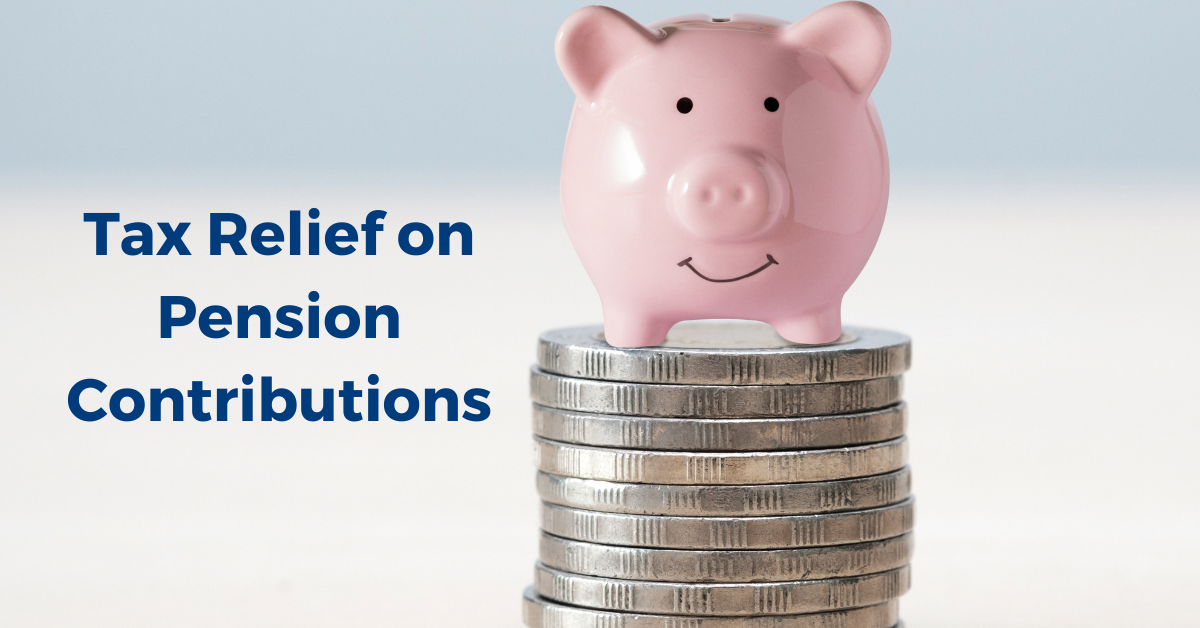Tax Relief on Personal Pension Contributions
Tax Relief on Personal Pension Contributions Overview
In this article we will give an overview of personal pension contributions and tax relief and certain limits to be aware of. In addition to personal pensions there are other pensions, such as workplace pension schemes and others, which we have not covered here.
When considering making personal pension contributions we recommend you take advice, from ourselves or, from your current independent financial adviser.
Broadly, there are two ways in which you can get tax relief on your pension contributions.
Workplace pension: Where your employer deducts the pension payments from your pay, before any tax is deducted. In this case, you receive tax relief straight away, by paying less tax.

Personal pension: Contributions are made from your net pay, after tax has been deducted. This is then boosted by 20% tax. As a result, this is added to your pension pot, subject to certain limits.
The pension provider receives your contribution, and 20% tax relief is added to the pension pot by the government.
- For example: if you pay £80 into your pension, the provider will claim £20 and £100 is added to your pension pot.
Higher rate pension tax relief
If you are a higher rate taxpayer you can claim further tax relief, at your higher rate, from HMRC. This is usually claimed through your self-assessment tax return. If you do not complete a self-assessment tax return, you can contact HMRC.
- So, if you pay income tax at 40%, you could claim an extra 20% tax relief.
Limits on the tax relief
There are two limits you should be aware of:
- Relevant UK earnings
- Annual allowance
Relevant UK earnings
An individual can make unlimited contributions, subject to the annual allowance. However, the tax relief available on the contributions is up to the higher of:
- £3,600 gross contributions
- Relevant UK earnings
Total gross contributions made by you, or somebody else on your behalf, must be equal to, or less than, your relevant UK earnings for the tax year in which they are made. Tax relief is only given up to the amount of your relevant earnings.
- For example: if you have £20,000 pension contributions and your relevant earnings are £15,000, tax relief will only be applied to £15,000.
Investment income such as income from savings, dividends and rental income do not count towards relevant earnings.
This condition does not apply to employer contributions made into your pension.
Relevant UK earnings are earned income for example:
This list is not exhaustive…
- income from employment (for example salary, wages, bonus, over time or commission)
- any redundancy payment above the £30,000 tax exempt threshold
- benefits in kind, which are taxable
- profit-related pay (including the part which is not taxable)
- income from a trade, profession or vocation conducted individually or as a partner personally acting in a partnership
- rental income from UK or EEA furnished holiday lettings businesses
- patent income.
Annual allowance
The other limit to be aware of is the annual allowance. This is the total amount that can be saved into your pension pots in a tax year. This includes personal payments, growth of certain pension funds and employer contributions. For most people the annual allowance is £40,000, increasing to £60,000 from 6 April 2023. This may be less for those with an “adjusted income” of over £240,000, increasing to £260,000 from 6 April 2023. The annual allowance may be restricted to £4,000, increasing to £10,000 from 6 April 2023, for people who make use of flexible access to their money purchase funds.
- Unused allowance can be carried forward for three years.
- If your annual allowance is exceeded then a tax charge will apply on the excess, at your marginal rate of tax.
Always take advice
Making pension contributions can be really tax efficient. However, several factors should be considered when deciding when to make payments, and where those payments should go.
You should always take advice from your financial advisor when considering your options. If you do not have a financial advisor then we can pass you details of contacts we trust and work with closely. Get in touch today to discuss your individual needs.
Shaw Austin are a firm of Chartered Accountants based in Chester. We support independent business throughout the UK. We take the headache out of business accounting and taxation by providing our clients with a personal service.
This article includes rates and data which is correct on date of publication. This is a general article to assist readers. Professional advice should always be taken in respect of your personal circumstances.
Updated March 2023

